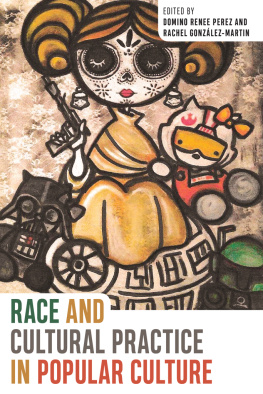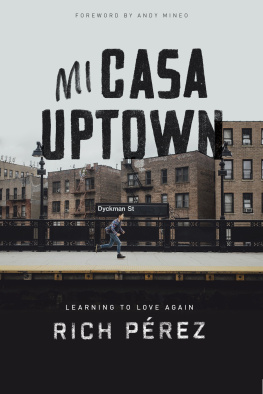Library of Congress Cataloging-in-Publication Data
Names: Perez, Domino Renee, 1967- editor. | Gonzalez, Rachel Valentina, editor.
Title: Race and cultural practice in popular culture / edited by Domino Renee Perez and Rachel Gonzalez-Martin.
Description: New Brunswick, New Jersey : Rutgers University Press, [2018] | Includes bibliographical references and index.
Identifiers: LCCN 2018006160| ISBN 9781978801318 (cloth) | ISBN 9781978801301 (paperback)
Subjects: LCSH: Race in mass media. | Mass media and cultureUnited States. | Popular cultureUnited States.
Classification: LCC P96.R3152 U5575 2018 | DDC 305.8dc23 LC record available at https://lccn.loc.gov/2018006160
A British Cataloging-in-Publication record for this book is available from the British Library.
This collection copyright 2019 by Rutgers, The State University of New Jersey
Individual chapters copyright 2019 in the names of their authors
All rights reserved
No part of this book may be reproduced or utilized in any form or by any means, electronic or mechanical, or by any information storage and retrieval system, without written permission from the publisher. Please contact Rutgers University Press, 106 Somerset Street, New Brunswick, NJ 08901. The only exception to this prohibition is fair use as defined by U.S. copyright law.

The paper used in this publication meets the requirements of the American National Standard for Information SciencesPermanence of Paper for Printed Library Materials, ANSI Z39.48-1992.
www.rutgersuniversitypress.org
Manufactured in the United States of America
FREDERICK LUIS ALDAMA
I am a consummate consumer of all things pop culture. Late at night my laptop glows with blue phosphorescence; wrestling with insomnia I binge on televisual and silver-screen shows. My bed-stand lies buried under a wobbly stack of comics, currently topped off with indigenous-penned, smart and entertaining Super Indian , Quarantine Zone , My Hero, Marvel 1602 along with Bitch Planet Vol. 2 and some radical feminist Latinx zines. I wake to music playlists that variously include trip hop (Portishead, Tricky, Massive Attack), drum n bass (Peter Tosh, The Fugeess, J-Malik), acid jazz (Jazzmatazz and Digible Planets), Drake, Luis Fonsi, Miguel, and Ana Tijoux. And I wipe the glaze of sleep from my eyes and brain through hours of my thinking, writing, and teaching about pop cultural matters. Morning lectures for signature courses such as Intro. to Latinx Pop Culture and Film & Comics: Race, Gender, Sexuality, and Differently Abled wake me to the world.
Dont get me wrong. I love my novels as much as the next. My shelves are filled with book spines etched with names like Julio Cortzar, Gabriel Garca Mrquez, Junot Daz, Elena Garro, Julia Alvarez, Salman Rushdie, Yasunari Kawabata, Carlos Fuentes, Luis Urrea, Dagoberto Gilb, Michael Nava, Ana Castillo, Denise Chvez, Carmen Machado Assis, among others. These same shelves include poetry collections of the most rarified sort (the maddening Apollinaire, for instance) along with some seriously self-reflexive, meta-critical Criterion Collection DVD films. I even have a Janson history of art tome thats gathering dust. And, I occasionally suit up to catch some high-brow live symphonic compositions.
Race, sexuality, gender, differently abled issues come alive mostly in and through my engagement with and thinking through pop culture, however. Its my primordial soup. I felt less different as a kid after having seen how much fun the Addams family had togetheran Othered family like mine in Sacramento. It was comic books that allowed me to soar far above my modest, single-parent Latinx tellurian confinesand expand my English vocabulary. It was an imaginary lightsaber that allowed me to slice-and-dice the Bros Ortiz, our neighborhood bullies.
Im not alone. Many of us racialized and historically marginalized subjects can say the same. Sherman Alexie opens his LA Times reflection on the joys of writing and reading thus: I learned to read with a Superman comic book. Comic book creator and scholar, John Jennings reflects: Growing up black, poor, and Southern made sure of my imperceptibility to the mainstream. So, like most invisible people, I turned to stories in popular media to start to build some sense of self to reflect back to my burgeoning psyche ( Latinx Superheroes xi). And, creator of El Muerto and Latino Comics Expo cofounder Javier Hernandez reflects: I dont remember the media itself (in-print comic, film, or TV show) when I first discovered Zorro, but I do recall imagining a character dressed in a fanciful black costume, riding atop a horse while brandishing swords and a gun. No matter his Spanish origin, I imagined myself, a Latino kid with Mexican ancestry, as this superhero ( Latinx Superheroes 183).
While I clearly think that pop culture matters in our everyday lives, scholarly inquiry, and knowledge dissemination, not all pop culture is made equallyespecially when it comes to matters of race, sexuality, gender, and differently abled subjects and experiences. I had the great misfortune of sitting through Dax Shephards silver-screen remake of the 70s show, CHiPs (2017). Unfortunate because Shephard as director and screenplay writer throws Latinx characterization back to the time of the Unenlightenment: Michael Pea stars as a Frank Ponch Poncherello who is singularly defined by his sexual addiction (hand jerks or any convenient hole)and sans any winks of irony or self-reflexivity. And, theres the hyperbolic histrionics of Sofia Vergara playing Gloria in Modern Family that continue to rankle. I can say the same of J-Los role as Marisa Ava Marie Ventura in the film Maid in Manhattan (2002) who is redeemed and made good (after being bad for supposedly stealing a fur coat) by association with aristocratic whiteness (Ralph Fienes as Christopher Marshall). Her role as Harlee Santos in the 2016-TV series Shades of Blue (20162017) isnt much better. The shows creator, Adi Hasak, characterizes her as a corrupted, double-crossing Latinx single mam, playing into and reinforcing those age-old stereotypes of Latinas as malinches.
However, even these instances that lack a will to style (responsibility to representations of Latinx subjects both in form and in content) can reveal much about life for intersectional subjectivities in the United States. They can and do reveal the pernicious legacy of the EuroSpanish casta system that continues to privilege light-skinned Latinxs in the hemispheric Amricas; they can and do reveal how Latinas are often depicted as bad and all bodied. They can and do shed light on how pop cultura can evince a great will to style. I think of how J-Lo turns the tables of whose peeping who, at least momentarily, on this saint vs. sinner, virgin vs. whore stereotyping in her music video I Luh Ya Pap (2014). And how corporate megalith Fox can create shows like Brooklyn Nine-Nine (2013) that push Latinx complexity into the quotidian boob-tube lives of U.S. Americans; with Detective Rosa Diaz (Stephanie Beatriz) and Detective Amy Santiago (Melissa Fumero) the shows creators Dan Goor and Michael Schur serve up some of TVs smartest, wittiest, badass Latinxs on prime time.


 The paper used in this publication meets the requirements of the American National Standard for Information SciencesPermanence of Paper for Printed Library Materials, ANSI Z39.48-1992.
The paper used in this publication meets the requirements of the American National Standard for Information SciencesPermanence of Paper for Printed Library Materials, ANSI Z39.48-1992.










